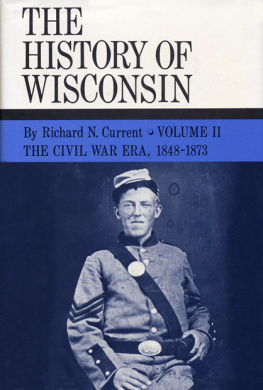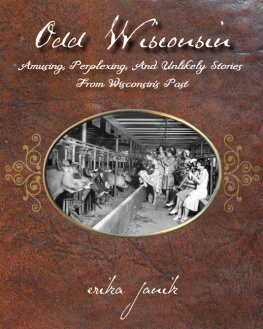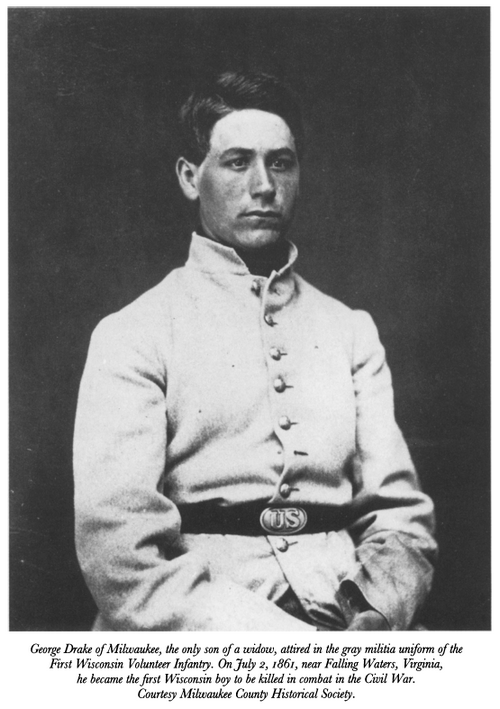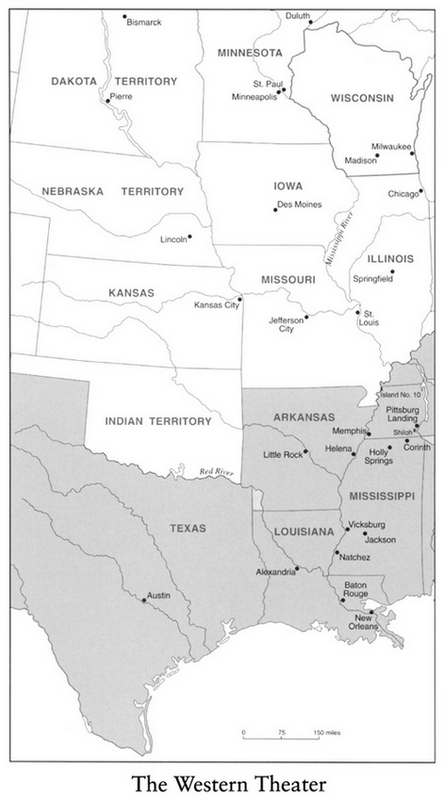Klement, Frank L. (19081994).
Includes bibliographical references and index.
1. WisconsinHistoryCivil War, 18611865. I. Title.
Preface
THESE BRIEF INTRODUCTORY REMARKS might well be called an explanation rather than a Preface. As some readers may recall, Wisconsin and the Civil War was first published in 1962 as part of the Wisconsin Blue Book, that biennial compendium of political, historical, and bureaucratic data compiled by the Wisconsin Legislative Reference Library and published by the Department of Administration of the State of Wisconsin.
In the late spring of that year, Leslie H. Fishel, Jr., director of the State Historical Society of Wisconsin and a member of the Wisconsin Civil War Centennial Commission, had proposed to the editor of the Blue Book that, as part of the nationwide commemoration of the Civil War Centennial, someone write a brief overview of Wisconsins role in the war (18611865). At the next meeting of the commission, of which I happened also to be a member, Dr. Fishel moved that we find someone to write a piece for the Blue Book. The commission enthusiastically endorsed his proposal.
At that juncture, Professor William B. Hesseltine of the University of Wisconsinanother member of the commissionremarked in his characteristic basso profundo that he knew just the right person. Gesturing in my direction with his pipe, he said, Youve been chosen.
Now, Professor Hesseltine was a distinguished member of the University of Wisconsins history department and a celebrated student of the Civil War. He had been my mentor at the University of Wisconsin, where I had earned my doctorate, and he was, at the time, also the president of the historical society. I greatly respected him, and I owed him a large professional and intellectual debt. I hated to say no, but I was teaching four courses at Marquette University at the time, and I was swamped with classwork.
Before I could utter a word, Hesseltine growled, The due date is around Thanksgiving. With that, I meekly submitted.
Ultimately, the deadline was extended to December 31, and my essay grew to more than a hundred pages. After its publication in the Wisconsin Blue Book, the State Historical Society of Wisconsin used the same plates to produce a booklet version of Wisconsin and the Civil War. Even though it had neither illustrations, bibliography, nor index, and though space constraints meant that I had to omit several important aspects of Wisconsins role in the war, a gratifying number of readers seemed to consider my little booklet useful and instructive. Before long, it went out of print; but because a fire in the printing plant ruined the plates, no second printing was undertaken.
In 1993, on the rising swell of another wave of interest in the Civil War, the editors of the State Historical Society of Wisconsin approached me to ask whether I might be interested in revising and expanding my booklet, resetting the type, and upgrading it with illustrations, a bibliography, index, and other appurtenances. I was delighted at the prospect of giving Wisconsin and the Civil War this new lease on life. Like many another author, I was pleased to have the opportunity to rethink and revise what I had written thirty years earlier. What was more, I now had the opportunity to treat a number of topics I had, for one reason or another, given short shriftfor example, soldier voting-in-the-field, legal and constitutional aspects of the war, the military campaigns of 18641865, and the story of Wisconsins black troops. I set to work at once.
About one-third of this book is entirely new material; the rest has been throughly revised and edited. Although it tells a fairly straightforward story, and still lacks footnotes, I am reluctant toconcede that the text is not scholarly, if only because it represents the distillation of a lifetime spent researching, writing, and thinking about the Civil War. I believe it is important for Americans to know something about the pivotal event in their history, because the outcome of the war, and its effectsindeed some of its underlying causesare with us still.
I am grateful to the State Historical Society of Wisconsin for encouraging me and assisting in this endeavor. My special thanks go to Mrs. Jane L. Gray, assistant to the chair of the history department at Marquette University, who typed all of the new material; and to Ms. Judith A. Simonsen of the Milwaukee County Historical Society, who assisted with the bibliography and rounded up several of the illustrations.
I sincerely hope that the results will find a new audience, and that my book will justify William B. Hesseltines assertion in 1962 that it was a balanced, scholarly account of the total development of an American state involved in a great national crisis[and] a story which deserves to be read, and deeply pondered, by every citizen of Wisconsin.
FRANK L. KLEMENT
Emeritus Professor of History
Marquette University
January, 1994
Publishers Note About the Author
FRANK L. KLEMENT was born in northeastern Wisconsin in 1905a country boy who grew up on the banks of the Embarrass River, as he liked to say of himself. He did his undergraduate work at the Wisconsin State Teachers College in Stevens Point and taught in Beloit and in rural schools before coming to the University of Wisconsin in Madison, where he earned a masters degree (1935) and a Ph.D. in American history (1946). After teaching briefly at Lake Forest College and at the Wisconsin State Teachers College in Eau Claire, he joined the history faculty at Marquette University in 1948, where he spent the balance of his long and fruitful career as teacher and historian. He was the author of nine books and more than fifty articles, all of them about the Civil War era and most notably on the topic of northern dissenters. Among his best-known works are Copperheads in the Middle West (1960), The Limits of Dissent: Clement L. Vallandigham and the Civil War (1970), and Dark Lanterns: Secret Political Societies, Conspiracies and Treason Trials in the Civil War (1984). He retired from full-time teaching in 1975 but continued as an emeritus member of the Marquette University faculty until 1984.
Frank L. Klement died on July 29, 1994, shortly after putting the finishing touches on the manuscript for this, his final book.













